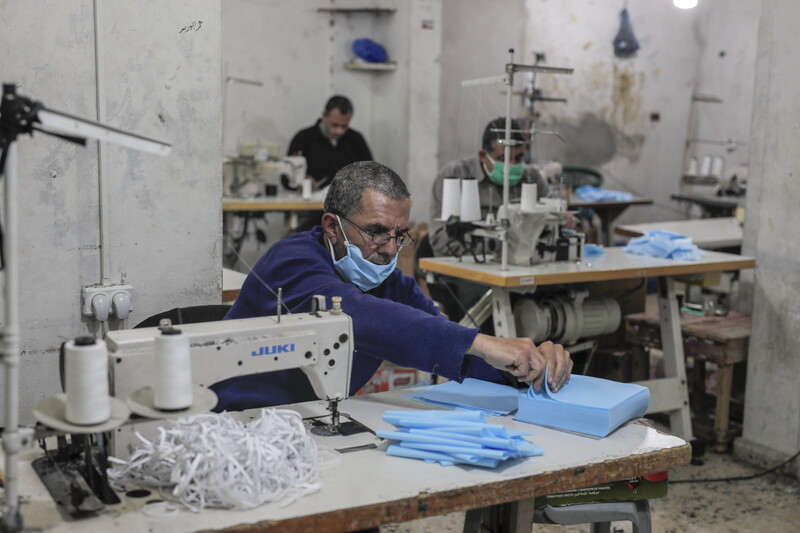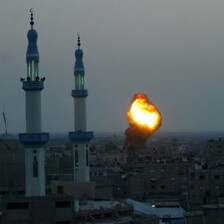The Electronic Intifada 30 June 2020

Workers sew medical masks for export to Israel in a workshop in Gaza City on 12 April 2020.
ActiveStillsAs the Gaza Strip records more cases of the coronavirus in its quarantine centers, its textile industry’s long-dormant response to need is in full gear.
This includes Israel’s needs.
The Noor al-Bahaa factory in Jabaliya refugee camp in the northern Gaza Strip switched operations in March from producing clothes for the domestic market to manufacturing thousands of medical masks and exporting almost all to Israel.
Ironically, some of the factory’s workers were themselves injured by Israeli snipers during Gaza’s Great March of Return protests.
Muhammad Anbar and Ezz Abu Dlakh, who work at the factory, were both injured while taking part in the demonstrations on 14 May 2018, which came to be known as Gaza’s bloody Monday after Israeli snipers killed more than 60 demonstrators that day and injured thousands more.
The stories of Anbar and Abu Dlakh echo each other.
Both were shot in the leg during the protests and both struggled to find work after.
Anbar, 29, lost his job as a clothes salesman in Jabaliya’s central market. After a six month recovery period, he regained his ability to walk albeit with difficulty. He found himself unable to find a job to support his parents and siblings, 11 in total.
It took almost two years before Anbar was offered a job at Noor al-Bahaa factory by its owner, Rezq al-Madhoun, 50.
Anbar and Abu Dlakh now sit behind a desk for almost 13 hours every day. Such work means their injuries are less of a burden.
They pleat medical masks by hand and place them inside sterilized bags. The masks are then transferred to warehouses and then to the Kerem Shalom checkpoint, the only place Israel allows goods in and out of Gaza.
“It never occurred to me that I’ll be working at a place that exports to Israel, which destroyed my leg,” Anbar told The Electronic Intifada.
“But ultimately I’m happy that I found a job to make a living and support my family.”
Dlakh also sees the irony in their labor but considers it a service to a greater good.
“Two years ago, Israel was killing us. Today, we’re producing masks to protect them from the coronavirus. We’re more human than they are.”
Israeli investors look to Gaza
There have been 72 confirmed cases of the new coronavirus in the Gaza Strip, and one death.
So far, all confirmed cases in Gaza have been discovered among individuals already in quarantine after returning from abroad, according to Gaza’s health ministry.
For that reason, Gaza did not go into full lockdown. Businesses like sewing factories did not stop working, as opposed to in Israel, which announced a state of emergency and suffered thousands of cases.
Hence, Israeli investors looked outside to meet the needs of their market.
In less than one month, the factory exported some two million medical masks to six Israeli corporations after being licensed for production by the Israeli health ministry, according to Bahaa al-Madhoun, Noor al-Bahaa’s executive director.
Now, the factory produces around 85,000 masks every day, al-Madhoun told The Electronic Intifada.
He claimed in order to ensure the production of the masks reached international standards, Israel allowed the transfer of 30 tons of raw materials – specifically three types of cloth – into Gaza in early March.
In turn, the factory now employs some 500 workers.
“It’s not only Israel requesting medical masks. We have also received an order from a delegation working with Doctors without Borders to produce masks for Belgium,” al-Madhoun said.
Work on that contract is due to begin soon.
Temporary boom
Al-Madhoun, who is personally known to this writer, said he thought the human benefits and considerations were more important than any political issues in this case.
“There’s mutual benefit. Israel wants medical masks, we need to employ as many people as possible,” he said.
The factory is currently working with a double-than-normal production capacity which has helped it recoup some losses over the past many years of Israel’s blockade, which was imposed in 2007 after Hamas won parliamentary elections.
Until 2014, trade between Gaza and Israel halted completely. Since then, Israel has allowed a tiny amount of goods produced in Gaza to be sold in Israel and the West Bank.
Al-Madhoun’s factory is not the only factory that exports medical masks to Israel.
The textile sector was traditionally among the best performing in Gaza, with some 900 factories employing more than 35,000 workers before Israel imposed its blockade on the Strip.
Today, after more than a decade of Israeli blockade, only about 140 factories still operate employing some 1,500 workers.
And despite the recent uptick, Maher al-Tabaa, head of Gaza’s Chamber of Commerce, Trade, Industry and Agriculture, said he did not expect improved trade relations with Israel after the pandemic is over.
A real flourish
One of the major obstacles al-Madhoun factory faced was the lack of sewing machines and spare parts after Israel banned their entry since 2006. But the factory managed to get hold of enough working machines to ensure a steady line of production.
“The demand is big. We work with 30 small workshops that had closed or were working with low capacity,” al-Madhoun added.
Adel Shaqoura, 48, turned a room of his house into a workshop after he fixed four sewing machines that had not been in use for 12 years.
“This is the first time in a long time I work on these machines. I thought they would never work again,” Shaqoura told The Electronic Intifada.
Shaqoura works with another three tailors for 18 hours a day. They produce 13,000 medical masks every month.
“I hope our work continues after the coronavirus. I don’t want to return to poverty again,” Shaqoura, who supports a family of seven, added.
Hundreds of families have benefitted in the Jabaliya camp.
To deal with the workload, al-Madhoun decided to distribute masks to families in the camp to make final and minor finishes, like cutting excess threads.
Among those who benefitted is Wafaa al-Najjar, 43, who desperately needed to support her family after her husband Diab, 48, became unemployed due to chronic illness.
The couple has nine children.
Al-Najjar adds finishing touches to masks. It provides her with a way to work from home. She earns around $90 a week.
“I used to clean houses upon request. It wasn’t permanent and it barely provided us with food,” al-Najjar told The Electronic Intifada.
Al-Najjar’s eight daughters help her every day.
Together, they clean around 2,000 masks per day.
“These are our best days since my husband stopped working as a taxi driver,” she said, hoping to continue the work after the pandemic.
Some scars, however, don’t heal with work. Abu Dlakh took time off on 15 May. On the day that marked his injury, he said, he did not want to work to “benefit those who destroyed my life.”
Hamza Abu Eltarabesh is a journalist based in Gaza.




